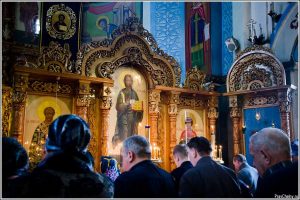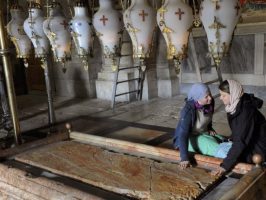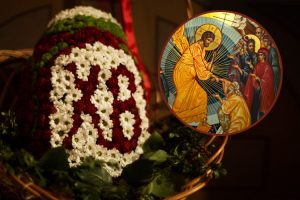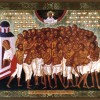Source: The Orthodox Peace Fellowship
In its Liturgy, its icons and prayers, Orthodoxy declares that all creation is illumined by God’s love. There is a redemptive possibility for all of creation, a worthiness which is the stamp of God’s image and likeness on humankind and, in a sense, on all created beings, however fallen. That worthiness calls out our love. In the Divine Liturgy, we offer our prayer and Christ’s “on behalf of all and for all.”
The celebration of the Resurrection is the center of Orthodox life, its richest and most solemn feast. Its thanksgiving — its Eucharist — commemorates the ultimate act of God’s love — the great humiliation of Christ, the God-Man Who hung naked on the Cross and harrowed Hades, filling even the depths of hell with His brightness, so that He might fill all things and raise His brothers and sisters and all creation, having trampled down death by death. Every Eucharist recalls and relives the Resurrection, but the Eucharist of Pascha is surrounded with unparalleled liturgical glory.
Here is a parable of that glory — an event witnessed by a friend of ours in Jerusalem on Pascha, 1995. A frail man in his eighties, the Patriarch of Jerusalem, expectantly entered the Church of the Resurrection, waiting a gift of love.
Year after year he awaited the same miracle, and never had he or any other Orthodox Patriarch of Jerusalem waited in vain. He knocked on the door three times. “Lift up your heads, O ye gates, and be ye lift up, ye everlasting doors, that the King of Glory may come in!” was his cry. Entering the Church, the Patriarch led the joyous procession to the Empty Tomb itself, knowing that inside this narrow space in which Christ rose from the dead, his Paschal candle would burst spontaneously into flame. Each year the candles have kindled. The flame of the Resurrection descends from heaven as a gift from God, a gift unique to the Orthodox Patriarch. From it the Paschal fires of the world are lit.
In 1995 the miracle was not long in coming. The doors opened. The Patriarch entered, only to reappear moments later, his entire being shining with the miraculous flame be brought out of the Sepulcher. “Come, receive the light from Him Who is the Light!” he intoned, and the light was passed to the candles of the waiting faithful. This was no ordinary fire. The flame was tall and red, recalling the tongues of fire at Pentecost.
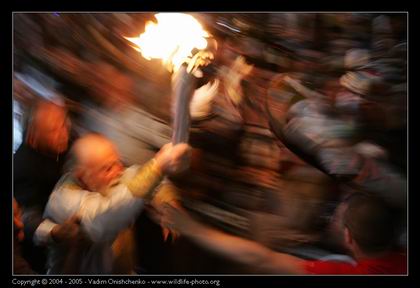
Bright as it is, the Paschal light is but a dim reflection of the Light, the Radiance that enlightens the darkest corners of the world. “The Light shone in the darkness, and the darkness was not able to overcome it.” Just as the particular gift of God’s love to the Orthodox Church is the Paschal Fire, so the Orthodox have been entrusted, as our gift of love to the world, with our especially joyous understanding of Christ’s Resurrection.
Resurrection radiance shines so brightly that it fills all creation. “Fos hilaron,” the merry and radiant Love of God, reflected and reflecting in an endless mirror, the mirror of grace, is the light of Christian love.
Having given an irresistible call to love, God has shown us how to love in Jesus Christ. He has given us the example of His spotless life, and the lives of millions of saints and martyrs.
Created as a unique person, yet like everyone “called to be a saint,” what will I do in response to His love? I will urge my heart to love God. I will focus on the reasons for this love, and I will beg Him to love through me as I cannot, for I can never understand His call to love, much less be capable of answering it. My heart’s call to God will be, “Lord, have mercy upon me, the sinner. Teach me to fulfill the commandment You have given, for Your commandments are ‘not grievous.’ You have asked of me what is impossible for man, but You would not ask the impossible, for ‘all things are possible with God.’ While I acknowledge the longing I have to love You, I also acknowledge my helplessness to do it. Lord, have mercy upon me, the sinner. For Your mercy is not the mercy I know, but the magnanimous love that You alone possess. As You share it with me, I will behold that glory which is Your love. Mind and soul will follow heart into the captivity of that great love; only as I abide in You will I receive the capacity to love my neighbor as myself.”
We receive the Light of Christ in Holy Communion and are set ablaze. That Light has summoned us to the Feast of feasts, Holy Day of holy days, inviting all, even at the eleventh hour, to enter into the joy of our Lord. And now we are challenged with the work of the continuing Eucharist, the Eucharist outside the Orthodox Temple: “Let us call all who hate us, ‘brother.’ Let us forgive all in the joy of the Resurrection.”
St. Anthony the Great summed up Orthodox monastic theology in the words: “I am my brother.” By the light of the Resurrection, I reflect upon this truth: If I am my brother, I cannot condemn him, for I am as great a sinner as he. If I am my brother, I cannot let him go about in need. If I am my brother, hating him is hating myself. If I am my brother, his salvation is critical to my own. If am my brother, I will not rest until I share with him the joyful life in Christ. If I am my brother, I cannot bear his condemnation. If I am my brother, I must forgive all. If I am my brother, his injustices are mine. If I am my brother, I will pray for him when hope seems gone. If I am my brother, I will love him as I love myself.
I am surrounded with this kind of love. My family shows this generous love to me. My Church family, as well as those outside the visible boundaries of the Orthodox Church, show me this love every day. I see it everywhere: “Christ behind me, Christ before me.” It puts my paltry response to God’s love to shame, and yet it gives me hope — hope that Christ will also do His great work in me.
When our Lord Jesus Christ defined our neighbor, He gave the example of a Samaritan, one who was despised, and who had been taught to despise the man he helped, a man of a distinct but closely-related faith — perhaps as closely-related as the Christian confessions are to one another.
The Good Samaritan’s act of neighborliness required great humility. What does it cost me to love my neighbor “as myself?” Ironically, though I am a member of Christ’s Body, I would rather be aloof and secure than to acknowledge that “the Spirit blows where it will.” I would rather turn inward, walk backward in time to some imagined place in Church history where there were no divisions. I would rather not hear of injustices committed by Orthodox (unless in a jurisdiction I do not prefer). I would place blame for schisms and heresies completely on schismatics and heretics, rather than on my hardness of heart. Yet there would never have been such divisions had it not been for pride, arrogance, and the misuse of power — on all sides. If I do not repent this arrogance, then I am not like the Samaritan, pouring oil on deep and festering wounds, but like the “priest who saw him, and passed by on the other side.”
“If you do not love your brother, whom you have seen,” asks St. John, “how can you love God, Whom you have not seen?” If I refuse to find my brother in myself, I am blind, also, to my faults. But because the God who is “greater than our hearts,” has not condemned me, but forgiven me in Christ, I dare not condemn my brother. And together we will even rethink our histories, ceasing to consider ourselves the oppressed and the oppressor. In the light of the Resurrection, I can see that “I, my brother” includes the Greek and the Macedonian, the Jew and the Arab, the Catholic and the Protestant, the black and the white, the Christian and the Moslem, the Serb and the Croat, the settler and the Native American — inasmuch as I receive these and all my neighbors in my heart, and humbly and respectfully commend them to the heart of God. And I will ask God, by the mercies of Christ, to forgive all sinners, “of whom I am first.”
When I have forgiven all, I will love all. My heart will be filled with a goodly theme — I will address my ode to the King — He will be fairer for me than all the sons of men, and His Face in all of them I will seek. How can I tire of this new life? How can I find enough of the truth, the beauty, the grace of God? How can I thank Him enough for so many beautiful expressions of His love in others?
The seed which falls into the ground and dies brings forth fruit. The seed will drop into my heart and my heart will spring into flame. Then I will understand that the fig tree withered only because it refused to bear for Him, not because it could not. And I, like it, must burst into fruit at His touch, in season or out of season, for “I can do all things through Christ, Who strengthens me.” When will this begin? When if not now?
“From this day, from this hour, from the minute,” says St. Herman of Alaska, “let us love God first of all.” Because the Resurrection had freed his heart, St. Herman was able to receive, and therefore to give, extraordinary love to God and man. He saw the Native Americans with the eyes of Christ and thus served them as persons worthy of respect and honor, worthy to receive the Gospel of Christ, having been lovingly created in the image and likeness of God. He saw the holiness of all creation, and gave it the reverence love demands. May his prayers and example fire us with the love of God to “go, and do likewise.”
Sue Talley has a Masters of Music degree in piano performance, has taught piano at Whitworth College, and has done additional graduate study in church music at St. Vladimir’s Orthodox Seminary. She and her husband, singer Dana Talley, have given concerts all over the United States as well as in Italy, Russia and Albania.
reprinted from In Communion (issue 8, Pascha 1997)












